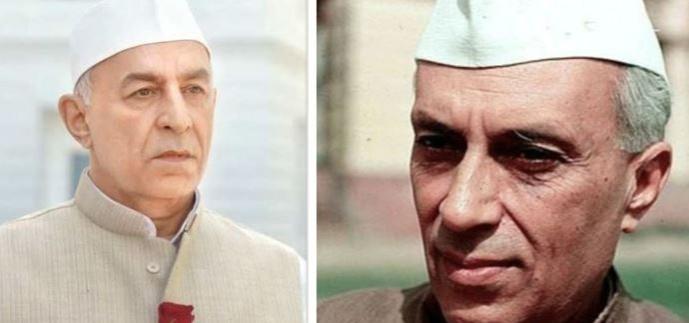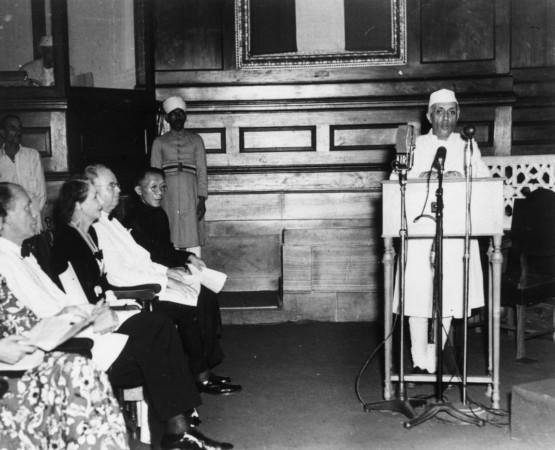
Why did Jawaharlal Nehru decline permanent membership in the UN Security Council not just once but twice? Was China's membership in the all-powerful world body more appealing to the idealist first prime minister than India's own membership? These questions have been discussed many times over in the past several decades. Nehru critics have categorically said he had let a great opportunity slip by while his supporters pointed at more complex diplomatic scenarios of the Cold War era.
The latest op-ed piece in the Times of India on Wednesday has brought the issue to the fore again. In the piece, former diplomat DP Srivastava places unequivocal facts in front of the reader that shows Nehru clearly let that opportunity pass by, not just once but twice in the 1950s.
Srivastava calls it Nehru's Himalayan UN gaffe. To bring more credence to the long-argued topic, the author says that he personally stumbled upon a crucial cache of documentary evidence of what happened in the high-level corridors in the 1950s. The files that he came across in 1995 in his capacity as the director in the Ministry of External Affairs were the original documents on the subject that included internal deliberations of the period.
A whole lot of documents related to the US and Russian plans to give India a permanent membership in the Security Council have been declassified since then. Various reports since then have revealed that Nehru was averse to replacing China in the esteemed world body. Nehru's arguments were many: India deserves a seat, but China deserves it more; it would be unfair of India to collude in a Western plot to remove China; the US could be using India to thwart a communist China; and that there won't be any net gain if India's relations with China worsens over this matter.
However, it's a travesty that China soon enough broke Nehru's heart with the invasion in 1962 and the subsequent humiliating military loss Nehru suffered.
The background

The UN Security Council was formed in 1945, when India wasn't yet independent. After independence from Britain in 1947, the Nehru-led India became a shining star in the galaxy of young new nations. Nehru and India yearned for greater global recognition but history says that British Prime Minister Winston Churchill thwarted India's ambitions, including those to get a seat in the Security Council.
The reversal of fortunes came around 1950. Following the Chinese revolution in 1949, the official Chinese government of the time retreated to Taiwan while the Communist China (PRC) came into power under Mao Zedong in Beijing. The United States sensed trouble seeing a rising wave of socialism in Asia.
That's when the first offer for permanent membership in the UN Security Council came to India on a platter. However, Nehru defiantly ignored the US State Department's move to remove China from the Council and put India there. "India because of many factors, is certainly entitled to a permanent seat in the security council. But we are not going in at the cost of China," Nehru wrote to his sister Vijayalakshmi Pandit, who was India's ambassador to the US.

Historian AG Noorani wrote in Hindu Frontline explaining how Nehru clearly articulated his stand on the issue. He reproduced a part of Nehru's note that reads as follows:
"Informally, suggestions have been made by the United States that China should be taken into the United Nations, but not in the Security Council and that India should take her place in the Security Council. We cannot, of course, accept this as it means falling out with China and it would be very unfair for a great country like China not to be in the Security Council. We have, therefore, made it clear to those who suggested this that we cannot agree to this suggestion. We have even gone a little further and said that India is not anxious to enter the Security Council at this stage, even though as a great country she ought to be there. The first step to be taken is for China to take her rightful place and then the question of India might be considered separately."
This document shows how Nehru saw the entire issue. He stood behind the original Chinese claim to the UN seat like a rock though he essentially believed that India also deserved a seat. That was the self-effacing Nehruvian approach. Nehru's sacrifice has continued to haunt India for long though. When the US took the lead to accept PRC in place of Taiwan (ROC) in 1971, the first veto Beijing made in the Security Council was to deny membership to Bangladesh. This was done with the express purpose of clipping India's wings and stopping its perceived ascendency in the region after New Delhi effectively split Pakistan into two parts to liberate Bangladesh.
More recently, China clinically thwarted India's ambition to become a member of the crucial Nuclear Suppliers Group (NSG) by repeated use of its veto power. Another hurt Beijing inflicted on India with its veto power was the continued opposition to the demand to declare Masood Azhar a global terrorist.
The second chance
It wasn't that Nehru was given only a single fleeting chance. In 1950 Nehru had the right to suspect a devious US plan behind the offer to India. But in 1955 the offer came from Russia. History records that Soviet Prime Minister Nikolai Bulganin offered Nehru the coveted position during Nehru's visit to Moscow in 1955.
Following is the quote produced in the op-ed piece regarding the Nehru-Bulganin discussion:
Bulganin: "While we are discussing the general international situation and reducing tension, we propose suggesting at a later stage India's inclusion as the sixth member of the Security Council ..."
Nehru: "Perhaps Bulganin knows that some people in USA have suggested that India should replace China in the Security Council. This is to create trouble between us and China. We are, of course, wholly opposed to it."
Nehru may have had his reasons to defy the US-Russian offer more than 60 years ago. But separated by decades of setbacks India has had to suffer because of that decision, it stands out as a wrong call. Nehru's supporters have steadfastly defended him though. One document they cite most often is Nehru's statement in parliament in September 1955. In that statement Nehru categorically denied there was any proposal to give India a UN Security Council seat.
This was the statement: "There has been no offer, formal or informal, of this kind. Some vague references have appeared in the press about it which have no foundation in fact. The composition of the Security Council is prescribed by the UN Charter, according to which certain specified nations have permanent seats. No change or addition can be made to this without an amendment of the Charter. There is, therefore, no question of a seat being offered and India declining it. Our declared policy is to support the admission of all nations qualified for UN membership."
Now, given the mass of evidence otherwise, that statement looks dubious as well. Why did Nehru deny there was an offer?

















